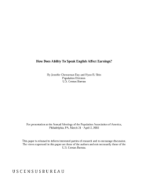
An official website of the United States government
Here’s how you know
Official websites use .gov
A .gov website belongs to an official government organization in the United States.
Secure .gov websites use HTTPS
A lock (
) or https:// means you’ve safely connected to the .gov website. Share sensitive information only on official, secure websites.
-
//
- Census.gov /
- Census Working Papers /
- How Does Ability To Speak English Affect Earnings?
How Does Ability To Speak English Affect Earnings?
How Does Ability To Speak English Affect Earnings?
For presentation at the Annual Meetings of the Population Association of America, Philadelphia, PA, March 31 - April 2, 2005
This paper is released to inform interested parties of research and to encourage discussion. The views expressed in this paper are those of the authors and not necessarily those of the U.S. Census Bureau.
Introduction
In 2000, the percentage of people in the United States who spoke a language other than English at home was 18 percent, up from 14 percent in 1990, and 11 percent in 1980. Among people who spoke a language other than English at home in 2000, 55 percent also spoke English “very well,” 22 percent “well,” 16 percent “not well,” and 7 percent “not at all.”
Among people in the labor force in 2000, 16 percent reported they spoke a language other than English. For many reasons the ability to speak English may affect a person’s ability to make money. Difficulty speaking English can adversely affect the ability to get a job, get a full-time job, and earn competitive salaries in the U.S. labor market. Employers may avoid hiring otherwise qualified individuals who have difficulty communicating effectively. People who have difficulty with English may feel uncomfortable applying for some jobs that require proficiency in English.
Previous research has examined the relationship between language skills and earnings. Several studies showed that language attributes play an important role in explaining the wage differences in earnings among Hispanic and Anglo workers (Reimers, 1983; Greiner, 1984; McManus, Gould, Welch, 1983). Other studies have found a positive relationship between earnings of immigrants and the length of time in the host country, often interpreted as an indication that immigrants assimilate in the host country’s labor market (Chiswick, 1978; Carliner, 1980; Borjas, 1985). McManus, Gould, and Welch suggest that wage differences which are usually explained by ethnicity, nativity, and time in the United States can be explained by differences associated with English-language skills.
Using Census 2000 data, this analysis explores the extent to which people who speak a non-English language are penalized by their level of English-speaking ability. We start our analysis considering employment status, work status, and earnings of people who speak a non-English language. We next examine this relationship by worker's personal characteristics (age, sex, race/Hispanic origin, educational attainment, occupation, nativity, year of entry, and length of time in the US). We then consider the specific language spoken to determine whether some language groups have more of an advantage than others in their ability to earn money.
We address the following questions:
- Does English-speaking ability affect employment status, work status, and earnings?
- Do these relationships hold across a variety of personal characteristics which themselves relate to employment and earnings?
- Do the relationships between English-speaking ability and employment status, work status, and earnings differ among various language groups?
Share
Related Information
Some content on this site is available in several different electronic formats. Some of the files may require a plug-in or additional software to view.
 Yes
Yes
 No
NoComments or suggestions?


Top


